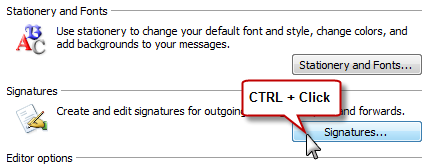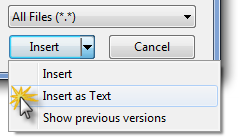Table of Contents
Email Signatures - general hints
Outlook
Images resize and become unsharp upon sending
When inserting an image into the message body or using it in your signature, the image can unexpectedly change in size and/or become unsharp when sending even when it still looked sharp when composing.
The cause of this issue lies in the way handles image dimensions in combination with its dpi value.
This guide contains several solutions and workarounds to this issues.
Background of the issue
This issue usually happens when you are using a picture other than 96dpi.
When inserting a picture, Outlook will rescale the image as if it was a 96dpi image. This means that if you have a picture of 150dpi with a height of 88px, it will be displayed as an image of 56px high;
88px/150dpi * 96dpi = 56px
It even gets worse; upon sending, Outlook will convert and compress (re-render) the images to 96dpi with the new dimensions permanently! This means that all the “detailed” picture information is lost and you'll be sending an image of 96dpi which is 56px high. This is of course a severe and very visible quality loss.
If your picture is less than 96dpi, then the opposite happens. A picture of 88px high with a dpi of 32 would then result in a 96dpi image of 264px high. So the result will be a very large image (but this time you can resize it back without the image becoming blurry).
This is a long outstanding issue/function/design choice which goes back all the way to Word 6.0 from 1993.
While this issue might not be a real issue when inserting pictures (which are usually too big anyway), it will become an issue when you have a carefully designed graphic to be used in a newsletter or signature; quality loss and unexpected changes in graphic sizes is not what you want then.
Re-render the image at 96dpi
The quickest and easiest way around this issue is to re-render your images at 96dpi. In general, this will not produce a noticeable quality loss.
You can do this with a number of picture imaging tools such as IrfanView (free). If you are using IrfanView view, use the following steps to re-render the image at 96dpi;
- Make a copy of your image (unless you don't mind losing the original).
- Open the image in IrfanView.
- Choose Image→ Resize/Resample
- At the bottom of the new dialog, change the DPI value to 96
- Press OK.
- Save the image.
Now, when you use the image in Outlook, it will keep the expected picture dimensions and won't become fuzzy upon sending.

Changing the dpi-settings in IrfanView.
(Click in image to enlarge)
Resize the image to its original dimensions
Another way to this without needing any additional application is by resizing the picture in Outlook itself.
After inserting the image, right click on the image and choose Size… (Outlook 2007 and Outlook 2010) or Format Picture… (Outlook 2003 and previous). You'll now see its size set to 100%. You must increase this percentage in relation to the decrease of the dpi via the following formula;
original dpi/96dpi * 100%
Example:
If you have an image of 150dpi, you'll have to set the percentage to 156%.
150/96 * 100% = 156.25%
Note that the above method is not perfect and a slight image distortion could still occur. This is because you can only set full percentage points and not, similar to the example, the exact outcome with the full number of digits after decimal. Sadly it is not possible to change the image's dimensions in Outlook/Word by specifying pixel values.
Resize signature images to their original dimension
If you use the image in your signature, then you can resize the image back to its original dimensions by changing the pixel values in the signature template.
To locate the signature template, hold the CTRL button when pressing the Signatures… button in Outlook's Options dialog. This will open the Signatures folder where you'll find the <signature name>.htm file. Open this file in Notepad and search for <img tag. You can now change the width and height values to the exact pixel values of the original image.

Quickly open the folder by holding CTRL when clicking the Signatures… button.
When creating newsletters or other e-mail design templates
If you are using the image in a newsletter or other template, then it is best to create this in a proper HTML-editor instead of using Outlook/Word to design it in.
When you're done creating the htm-file, you can inject the generated HTML code directly into a new message via;
Insert→ (Attach) File→ select the created htm-file→ down arrow on Insert button→Insert as Text
This will maintain the pixel values for the image as set in your HTML-design and thus its intended size.

Inject HTML directly via Insert As Text.
Additional solution for Outlook 2003 and previous
Outlook 2003 and previous have an option to either use Word or Outlook as the e-mail editor. The issue does not happen when you set Outlook as the e-mail editor. So when you do not want to use the Word features; switch it to the Outlook editor.
If you only want to keep Word as the e-mail editor and only want to change it to Outlook when sending out a newsletter and you want to design it in Outlook, you can also use;
Actions→ New Mail Message Using→ Microsoft Office Outlook (HTML)